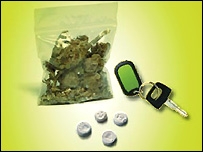Driving Under the Influence of Drugs May Be More Common Than You Think
The holiday season is upon us, and while that means general merriment, it is of course, stress-inducing for many. Beyond the usual stressors of holiday parties and shopping, is another little consideration that few people think of: increased roadblocks that randomly test for the presence of alcohol and drugs in drivers.
Yes, I mentioned testing for alcohol and drugs. While almost everyone is aware of the perils of drinking and driving, ingesting drugs and driving hasn’t really gotten the same amount of national attention. But “drugged driving” is a serious issue and recent statistics indicate that it is on the rise. And as the holidays are upon us, it may be an especially relevant time to learn more about the laws behind drugs and driving.
 First of all, one of the reasons that driving under the influence of drugs laws haven’t garnered as much national attention is because they are much more difficult to create and enforce, when compared to drunk driving laws.
First of all, one of the reasons that driving under the influence of drugs laws haven’t garnered as much national attention is because they are much more difficult to create and enforce, when compared to drunk driving laws.
For drunk driving, it is relatively easy to set a limit on when the blood alcohol content has impaired judgment beyond acceptable limits. Generally, this number is set at 0.08. However, when it comes to drugs, it has been much more difficult to find a blood content level that reliably corresponds with unacceptable, impaired judgment levels. This difficulty is compounded by the fact that drugs can linger on in the body for days or months, making it difficult to determine what someone’s current drug level actually is.
Nevertheless, there are still drug laws in place, although they vary by state (so you will want to consult with an attorney to go over the actual specifics of any case). However, what may be surprising to many people is that in most states, the definition of drugs is defined very broadly. That is, you can be convicted of a DUI (driving under the influence) or DWI (driving while intoxicated) for ingesting basically any drug. This includes illegal drugs, legally prescribed drugs, and even over-the-counter drugs.
Furthermore, the legal standard for when someone is “under the influence” can often times be whenever someone’s mental judgment is impaired in any way (again, this legal definition will vary by state, but this is a common standard among many states). Thus, it is easy to see how many cases of drugged driving can come from someone just ingesting a simple over-the-counter pill. If these medicines can make you feel woozy in even the slightest bit, then there may be a case for a DUI or DWI against you.
From here, the way to prove that someone is under the influence of drugs is very similar to the way the government would prove it in drunk driving cases. This proof will essentially come from circumstantial evidence. In these cases, the prosecution will look at how the car was being driven, the physical appearance of the driver, how the driver performed on sobriety tests, and any results taken from a test of the driver’s blood or urine.
In addition, many states have now enacted programs that train police officers to become Drug Recognition Experts. Once trained, these police officers can better identify signs of impairment and thus give better testimony in court as well.
Furthermore, beyond any DUI convictions, there are also separate proceedings by the DMV to think about. The good news about these proceedings is that not all state DMV’s will be able to go after a case of drugged driving.
The reason behind this is because the DMV can only go after cases where there has been a violation of some statute. So far, 19 states in the country have actually enacted statutes that specifically make it illegal to drive when someone has ingested drugs. So that means that in these states, the DMV will be able to conduct a case against drugged driving; but in the rest of the country, the DMV is unable to do anything. However, this does not necessarily mean that the offender will go scott-free either. The court, if it finds for a DUI conviction, can always enact harsher punishments, such as taking away driving privileges.
Thus, even though we all know as a matter of common sense not to drive when we’re not feeling well, it’s still hard to draw the line sometimes. And though these drugged driving laws may not garner as much attention as drunk driving laws, they’re sill very much in place and will result in harsh consequences. The safest bet, if you’re not feeling 100%, is simply to wait until you’re feeling better before you get behind that wheel.


Comments